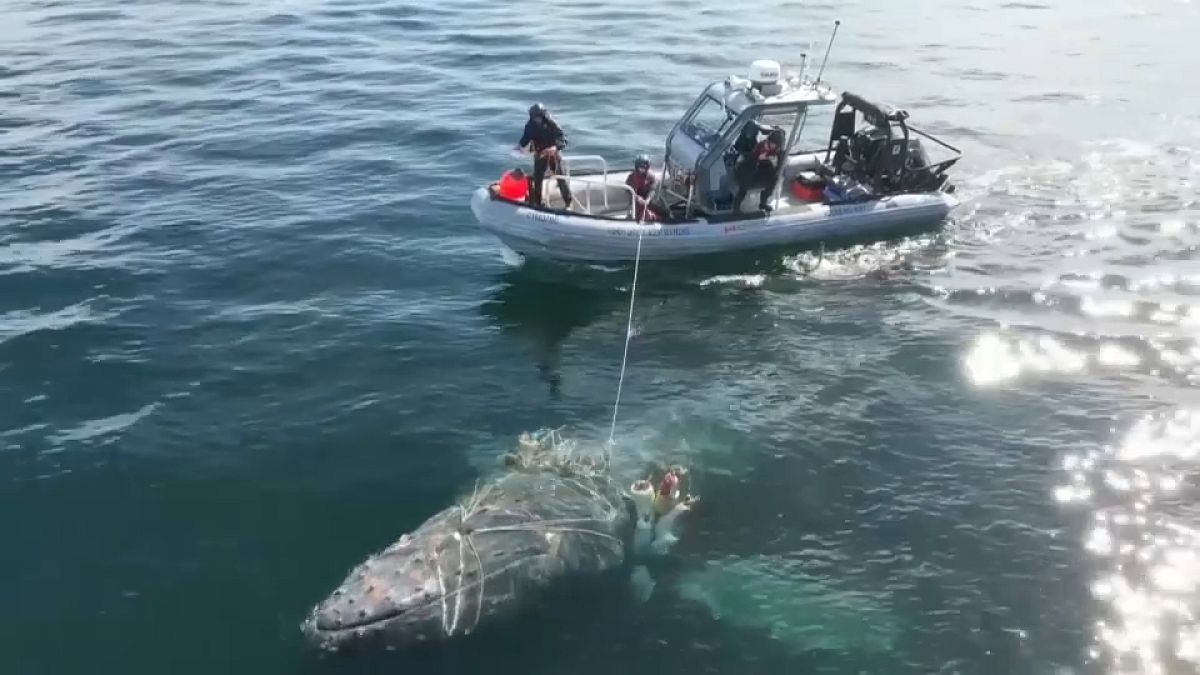A humpback whale entangled in fishing gear was successfully rescued after a grueling four-day operation led by Paul Cottrell from Fisheries and Oceans Canada in the Hecate Strait off British Columbia. The rescue effort involved over 50 rope cuts to free the 11-meter whale, which had been trapped in the gear. Unfortunately, during the same period, a 20-meter fin whale was found dead in Prince Rupert Harbour, possibly due to blunt force trauma. The incident has raised concerns among experts about the increasing risks faced by whales in northern British Columbia waters, particularly due to the rise in maritime traffic associated with projects like LNG Canada.
LNG Canada, a joint venture led by Shell along with partners Petronas, PetroChina, Mitsubishi, and Korea Gas, aims to build a liquefied natural gas export terminal in Kitimat, British Columbia. The project has been identified as a major contributor to the growing maritime traffic in the region, increasing the potential risks for whales and other marine life. Environmentalists and marine conservationists have voiced their concerns about the potential impacts of projects like LNG Canada on the local ecosystem and wildlife, urging for more stringent regulations and monitoring to protect vulnerable species like whales.
The successful rescue of the humpback whale highlights the importance of prompt action and collaboration in addressing wildlife emergencies. Paul Cottrell and his team’s efforts demonstrate the dedication and expertise required to navigate challenging situations and ensure the well-being of marine animals. However, the unfortunate death of the fin whale serves as a stark reminder of the threats faced by whales in the region, emphasizing the need for proactive measures to mitigate risks and prevent similar incidents in the future.
Experts have warned that the growing presence of maritime traffic, particularly associated with projects like LNG Canada, poses significant challenges for whale conservation efforts in British Columbia waters. The risks of entanglement in fishing gear, collisions with vessels, and other human-induced threats have the potential to impact whale populations and their habitats. As such, there is a pressing need for increased awareness, monitoring, and conservation measures to safeguard the welfare of these magnificent marine creatures and preserve the delicate balance of the marine ecosystem in the region.
Environmental organizations and wildlife advocates have called for greater accountability and sustainability in the development of industrial projects in British Columbia waters to minimize the impacts on marine life, including whales. The incidents involving the humpback and fin whales underscore the importance of balancing economic development with environmental protection to ensure the long-term health and biodiversity of the region’s marine environment. By implementing responsible practices and regulations, stakeholders can work together to safeguard the well-being of whales and other marine species while supporting sustainable growth and conservation efforts in the region.
In conclusion, the rescue of the humpback whale and the unfortunate death of the fin whale in British Columbia waters serve as poignant reminders of the complex challenges faced by marine ecosystems in the face of increasing human activities. Projects like LNG Canada highlight the need for careful consideration of environmental impacts and the implementation of effective measures to protect vulnerable species like whales. By prioritizing sustainability, conservation, and collaboration, stakeholders can work towards a future where both economic development and wildlife protection are harmoniously balanced in British Columbia’s rich marine environment.










